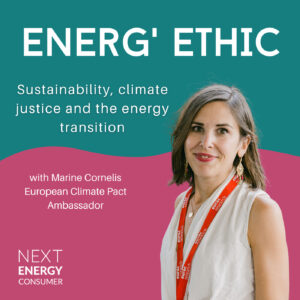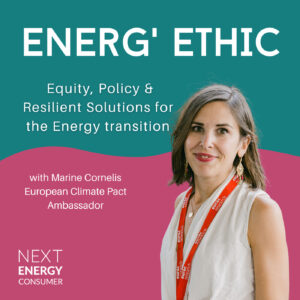Can renewable energy end energy poverty while creating better jobs? Let’s explore how Central and Eastern Europe is confronting these challenges.
In this episode, Marine Cornelis is joined by Miłka Stępień, Just Transition Campaign Coordinator for Central and Eastern Europe at CEE Bankwatch Network. Together, they explore the challenges and opportunities facing Central and Eastern Europe as the region works toward a fair and sustainable future.
Miłka, a dedicated environmental and social activist for over 25 years, shares her journey from her early activism days in high school to her focus on governance and decision-making structures in environmental issues. Reflecting on her upbringing in a mining family in Eastern Wielkopolska, one of Poland’s key just transition regions, she offers unique insights into the local impacts of coal transitions and the complexity of making renewables work for everyone.
“If I see something isn’t working, I feel the need to fix it,” Miłka recalls, emphasizing how her passion for problem-solving led her to environmental advocacy. Her work today focuses on ensuring that the energy transition isn’t just green but also socially fair, particularly for vulnerable communities.
The conversation delves into some of the most pressing challenges in Central and Eastern Europe, from eco-dumping and corruption to the socio-economic impacts of the green transition. Miłka highlights the importance of keeping high environmental standards, while also acknowledging the difficulties faced by the region.
“It’s crucial to bring nuance to the discussion—Central and Eastern Europe has experienced both gains and losses in the journey toward climate neutrality,” Miłka explains.
One of the central themes is the critical link between energy poverty and heating poverty, a major issue in Central and Eastern Europe. Miłka sheds light on how rising heating costs and outdated infrastructure are leaving many communities struggling, and how small, decentralized projects funded by the EU could offer solutions.
“Energy poverty in our region is less about electricity and more about how people heat their homes. We need to focus on retrofitting and making homes energy-efficient,” she says.
Miłka also emphasizes the importance of participatory approaches, ensuring that local communities have a say in the transition. She advocates for more technical assistance and independent advisors who can help smaller, rural municipalities access EU funds and implement green solutions.
“What we need is a network of energy advisors in every municipality, especially in rural areas, to guide people through the process of retrofitting homes and adopting renewable energy,” she highlights.
Finally, the episode touches on the broader need for systemic change in governance and decision-making processes. Miłka discusses the importance of tackling energy poverty through community-driven initiatives and highlights how independent advisors can play a pivotal role in providing the information and support needed to access funds and implement renewable solutions.
Join Marine and Miłka as they explore the complexities of the just transition in Central and Eastern Europe, and how renewables can play a key role in addressing energy poverty while creating better, more sustainable jobs.
This episode is brought to you by the European Environmental Bureau (EEB), Europe’s largest network of environmental groups, working to fight for sustainable development, environmental justice, and a voice for citizens in shaping a greener future.
Tune in to learn more about the energy transition and the people making it happen!
<iframe name="Ausha Podcast Player" frameborder="0" loading="lazy" id="ausha-M6US" height="220" style="border: none; width:100%; height:220px" src="https://player.ausha.co/?showId=e14Y3fmkjrnW&color=%23bb576e&podcastId=zYRNGHK0Wk0w&v=3&playerId=ausha-M6US"></iframe><script src="https://player.ausha.co/ausha-player.js"></script>



